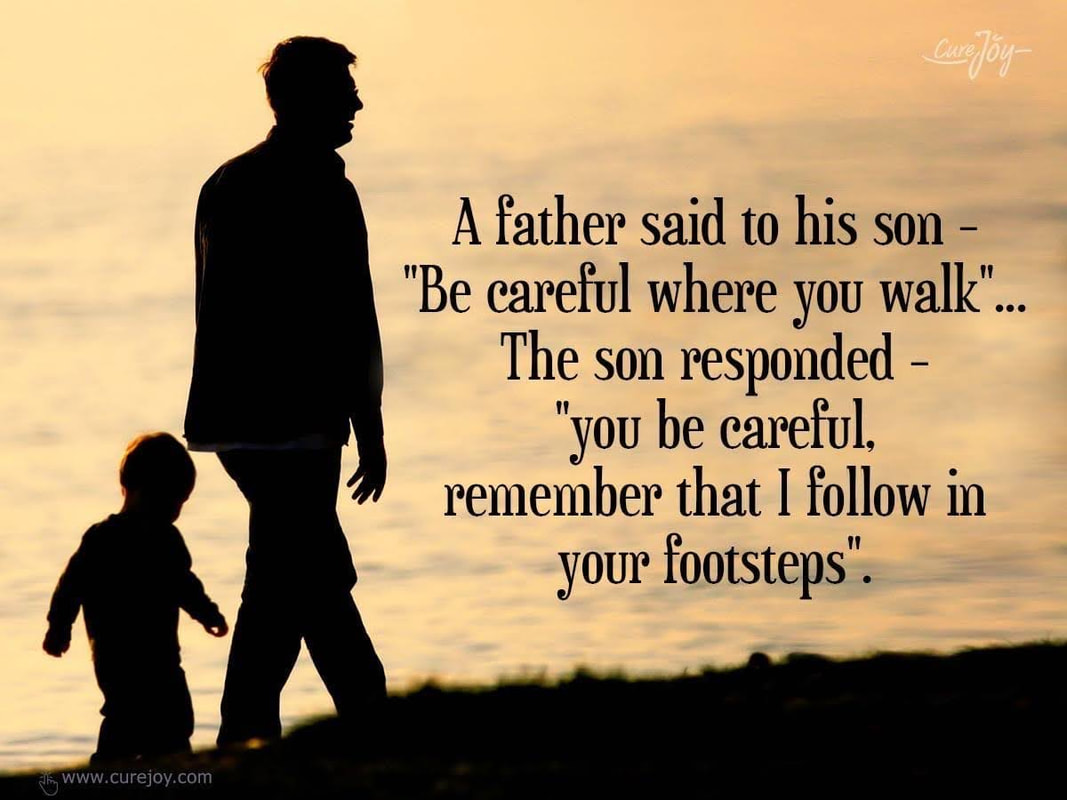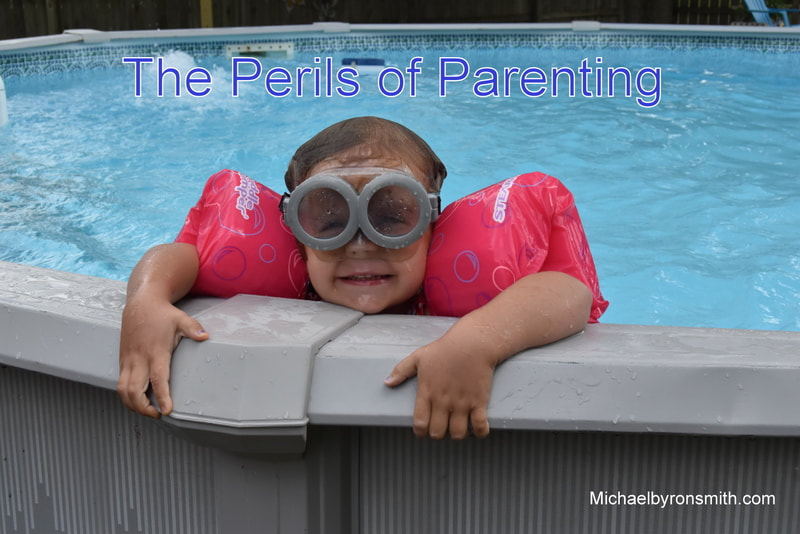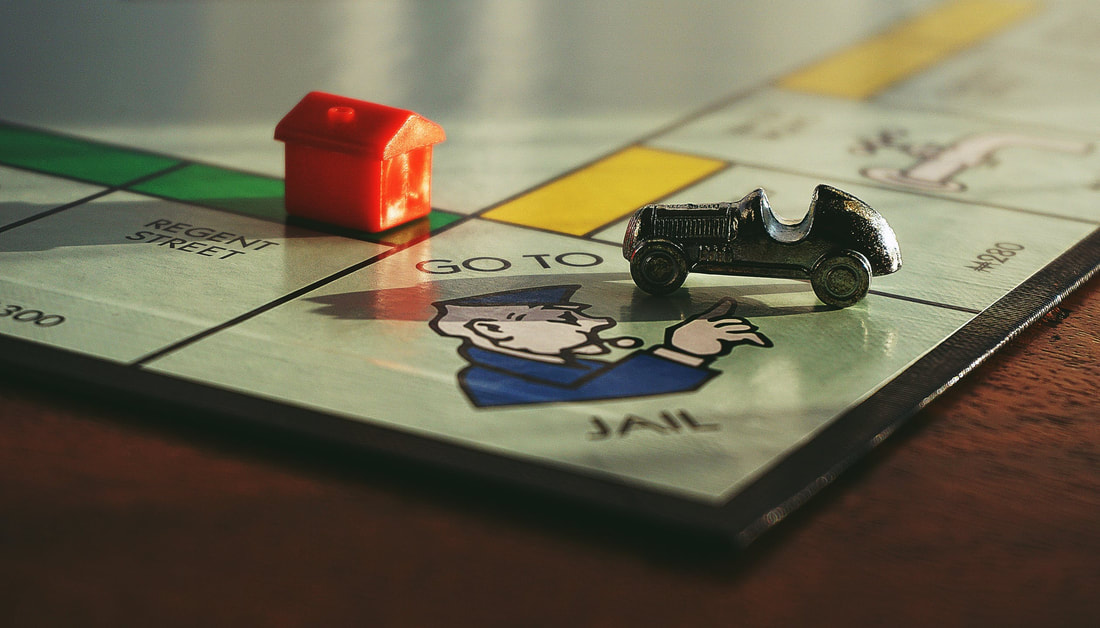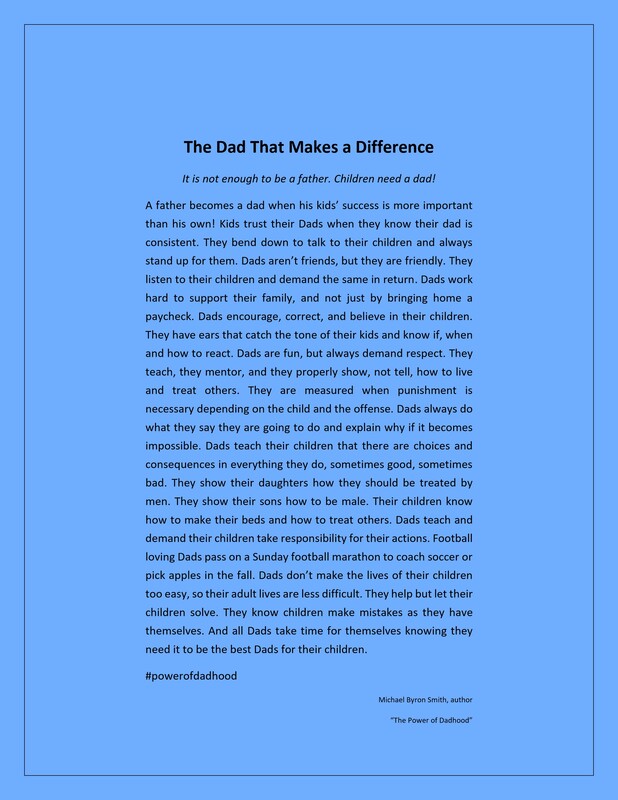 Parents much be good examples and teach proper conduct to their children. Fathers and mothers must follow through on their obligations and be sensible in their decisions or the wrong examples will be followed. Urge young people to be self-controlled, because being quick to anger or quick to love can devastate their futures. Do good things for others with integrity, dignity, and careful language to avoid conflict and to show the way to a good and fruitful life. As parents and children respect each other in their duties and obligations, as must employers and employees. An honest day’s labor must follow an honest day’s pay with respectful consideration for one another’s complaints. We have been given the gift of life and the means to do good things. Whether you do this for God, yourself, or your offspring, it will benefit all around us and those who follow in our footsteps. * * * What I wrote above was inspired by the Bible’s Titus Chapter 2. As a newcomer to the Bible for reasons I won’t get into here, these are my main takeaways from those verses. I respect the Bible’s teachings too much to be secular, yet I still have much to learn. In my modest version of Titus CH 2, I have taken out references to slavery and the subjugation of wives to their husbands (areas of controversy) to concentrate on the importance of being an example of good deeds and teachings. It is clear in my mind, as is obvious in my previous posts in my “Helping Fathers to be Dads” blog, that strong families with a strong ethical base are the cure for a crumbling society. Young people follow whoever shows the most interest in them. Hopefully, those would be parents. But sometimes the parents themselves are leading young men and women down the wrong path. That fact can lead to multiple generations of broken or struggling families. It takes someone who is in the predicament of being uninspired by those they love to become inspired by seeking help through their own volition. That help could be from reading, listening, the support of trusted mentors, or the church. When that happens, the ‘cycle of despair’ for that family branch is broken. Sometimes, a parent of their child will find a passage like Titus Ch 2 and get the inspiration they need. For some, it takes the secularization an important Bible lesson to reach those who do not follow it. For this reason, I wrote “Being an Example”.  ou know what kids want, besides sympathy, sweets, and getting their way? They want to be loved, understood, and protected. They also want someone to help them when they need it and to watch their backs. Who better to do that than Mom and Dad? What else do kids want? They want answers but may not ask. They want discipline but won’t admit it. They want consistency, but may not know it. They want attention, but on their terms. Surprisingly, perhaps, they don’t expect you to be perfect, but they do want you to be fair. It’s left up to parents to connect the dots, knowing when to give their kids what they want but may not realize. Discipline is the tough responsibility for most parents. Characteristically, discipline is accompanied by anger, uncertainty, tentativeness, and a desire to look past the infraction and often followed by remorse, guilt, and reflection. When my oldest daughter was a young teen, I became upset with her for reasons I don’t recall. But I became angry at her defiance at the time. It was stealthy defiance, the kind where kids give you the “how dare you” look. My rising anger involved yelling and threatening looks. As I recall, I acted more threatening than I would ever be in reality. Regretfully, I was resorting to fear as my weapon. My official stance is to never parent through fear, but we know that isn’t always easy. When a child gives you a smirk, or laughs at your reprimands, or ignores your directions, it is a show of disrespect. That disrespect is a challenge to you. It’s a test of where the limits are and a power-play you cannot lose. But how do you go about not losing? How do you keep your cool? If I had a pat answer to that, I would have a parenting show on the Oprah Winfrey Network. What I do know is you must have a response that is swift and strong - but without anger. But who am I kidding? How can you not have anger occasionally? When I say your response should be without genuine anger, I mean being out of control. Showing controlled anger helps to get your point across, IMHO. Without having any specific recommendation as to how to handle a challenge by your child, I do recommend that you be thinking at that moment, “Am I in control?” While fear is not a gold star tool of parenting, you must demand respect from your children. Fortunately, you can get that respect by your fairness and consistency throughout your parenting. It will do you well in most circumstances. But we don’t live under a permanent rainbow, nor do we ride unicorns on cotton candy clouds. Challenge is in children’s nature. It’s how they learn. When kids refrain from doing something, of which you would not approve, hopefully, their decision is based on fear of losing your respect and not out of fear of reprisal. But fear is a very close cousin to respect, and we can’t deny that. For instance, I admire 99% of police for what they do and the dangers they face. But I also have a bit of fear when one knocks at my door or pulls me over in traffic. Police carry weapons - there is both fear and respect in that. In a way, you are the law enforcers in your home, and kids react in different ways to your authority. Some will respect your earned authority (you’re a good cop) and others will not (evoking the bad cop). I still think about that time some thirty years ago when I frightened my daughter over her perceived disrespect for me. I may have overreacted (although I think she overreacted also). I regret that incident, but while I was angry and showed it, I knew what I was doing at the time. I was not out of control. I may not react the same way today, but my daughter did know one thing after that incident - I loved her, and I was being her dad. Summary There are no pat answers to parenting. However, always think through what you are doing. Never lose control. Mistakes will be made, and be comforted that you are not alone in making them. Perfection will not be the reason your kids love you. But there is something that will make them love (or hate) you, and that is their perception of you. If your children:
Your child’s perception of you is more important than your attempted perfection as a parent! Originally posted July 2019 How to Encourage Self-Care For Kids Kids today live in a complex world where they have easy access to a wealth of information, which they don't always know how to process. From an early age, it's important that children learn coping mechanisms and how to de-stress from the frenetic world around them. When children learn self-care, it makes it easier for them to identify their own physical and emotional needs, which paves the way for handling stress well in the future. As a parent or caregiver, you might be wondering where to start with teaching kids about self-care. Be a Role Model Parents or caregivers should practice self-care. Kids pick up on their caregivers' emotions and mirror what's happening in the home. Your anxiety and stress could rub off on them, so focus on maintaining balanced routines, eating healthily, and reducing work stress. Let Kids Be Bored You don't need to provide constant entertainment for children. Let them be bored. Bored moments inspire creativity and provide a blank canvas for their young imaginations to run wild. When you leave kids to their own devices in a safe environment, you'll soon find them recreating scenarios from school, making up dance routines, and putting on shows. Boredom allows for expression and new ideas. Get Kids Involved in Arts and Crafts Art can be therapeutic for children. It's an outlet for them to express their innermost emotions without having to verbally share them. Crafting can also improve hand-eye coordination and fine-motor skills, which builds confidence. Drawing is a great outlet for young people who suffer from anxiety, as it gives them a space to draw how they feel. Some kids are encouraged to match colors to emotions, which can help adults understand how they're feeling. Encourage Time Outdoors Encourage some time in nature, away from the screen. If you see your child is stressed, tell them about the calming effects of nature and instill a passion for the outdoors. As they get older, they'll learn that being outside is good for the mind and soul. Find outdoor spaces and activities for kids. Try paddle boating on the river, have a picnic, or cycle on trails in your area. Teach Kids to Breathe Mindfully Teach your child that being upset and anxious is normal, but they can make themselves feel better. A simple technique is to get them to take five or ten slow deep breaths. Count with them until they learn how to do it themselves. It's a worthwhile technique for calming the nerves. Schedule Family Time Whether it's daily or weekly, schedule family time. Decide on an activity that everyone enjoys, such as walking the dog or playing a board game, and encourage everyone to participate. One simple daily practice is to each share one thing about the day that you really enjoyed. This encourages connection, gratitude, and positivity. Practice Self-Care for Happiness Kids need to learn that happiness is essential. When practicing self-care from an early age, children will learn vital skills to handle stressors later on in life. This helpful article was submitted to 'Helping Fathers to be Dads' by Lacie Martin of Raise Them Well.org <[email protected]rg>
 “A Better Society, One Child at a Time.” That was the subtitle I chose for my book, “The Power of Dadhood”. My publisher, Familius LLC, changed the subtitle to “How to Become the Father Your Child Needs”. This subtitle is not misleading because this is what my book intends to help fathers to do. My only objection being the suggestion that any father receiving it as a gift may get the wrong impression from the giver. Of course, no judgement is being made. I’m not complaining, but I want to explain the reason for my original subtitle. As great as our American society is, we have pockets where crime, poverty and drug use are serious problems. These issues and others come intertwined. Find one of these issues and you’ll find the others. Grand ideas to fix these issues come and go. None will work without getting to the root causes and the finding the solutions for those root causes. It may not surprise you that in my mind, the root cause is the breakdown of the nuclear family; and the primary cause of that breakdown is a lack of nurturing fathers in the home! I believe prevention is much more effective than developing cures. Children brought up in a loving, nurturing atmosphere are not as likely, by far, to become criminals, drug users, or to find themselves in poverty. I can almost read your minds as you say to yourself, “Well, obviously!” So, if being so obvious, as a preventative measure, then where is the grand idea, the grand plan to cause more families to be whole? How do we fight crime? Crime is fought by the increased presence of police, or cameras (less freedom for all), or through punishment. Wouldn’t crime be better decreased by having better citizens? Fathers working with mothers are key in this effort! Food pantries help feed the hungry. How does that happen in America? Would not a young girl, raised in a two-parent family, who has been shown love and how to be properly treated, have a much better chance of finding the right man to marry. And would she not be likely to become a teen pregnant and alone, finding it difficult to feed her family? The rising cost of healthcare is a problem for all. The health habits of people are highly affected by how they were raised. Were fruits and vegetables a big part of your family’s diet? Or were fast foods much more common? Did parents smoke and pass on the habit? No doubt smoking and being overweight are huge problems for individuals and the healthcare system that takes care of them. An even more tragic healthcare issue is drug use! While even the best of families have issues with drug use, it is far more prevalent in broken and dysfunctional homes. Drugs lead to more crime, more deaths, greater healthcare issues, less schooling, and mental issues. It’s not difficult to understand why drug dealers work in impoverished areas, where crime is rampant to pay for habits. Our greatest natural resource is our youth! How our youth become contributing, even outstanding citizens, depends on how we raise them. So, if each mom and dad showed love and understanding, while consistently valuing and enforcing principles, our youth will feel love, have skills, and see the future as hopeful for them. A few of our youth will stray anyway, despite our best efforts. And some children raised in chaos break through somehow and experience success. These, however, are very rare anomalies. Don’t leave the fate of your children to chance. Moms are more often in the picture regarding their children. Dads are the parent usually missing or unfamiliar with their role. It’s not always the fault of fathers. Sometimes dads are not allowed, or discouraged by moms, to be involved in raising their kids. Some fathers are too young or selfish to be involved, having come from dysfunctional homes themselves, still lost in the cycle. The new dads, those without examples, need our help. They can stop the cycles in their families with our help. Imagine if every home had nurturing parents! Imagine is every child had both a male and female mentor. In a generation or two, crime, drugs, teen births, etc. would be decreased tremendously!! One child at a time!  “Beauty is only skin deep.” That’s what they say, and it’s true. Substance is what’s most important, But one should give beauty its due. mbs If you make breakfast for your kids, you're being a parent. If you make pancakes with strawberry eyes and a whipped cream smile, that's beautiful parenting. It's that little extra effort that stands out. To me, beauty is the truest sign of caring! The beauty I'm referring to can be visual, of course, but it can also be an act, a thought, or an introduction of soul into a lifeless situation. I’ve been fortunate enough to have visited Europe a few times. What really stuns me about that part of the world is the splendor of its architecture. There seems to be an appreciation for beauty there that is lacking in many US cities and towns. Cinder blocks can do an excellent job if all one needs is a reliable, safe structure, but it gives nothing to the soul. Any church, mosque, or synagogue will serve its congregation. But those structures that are magnificent bring a depth of meaning to worshipers that a converted strip-mall, storefront ‘house of worship’ cannot. I visit coffee shops and see people come and go. I can’t judge them or know what they may have accomplished. I do notice, however, how they dress and carry themselves. I particularly appreciate a senior man or woman who takes pride in their appearance. It tells me something positive about them. When watching homes being rehabbed on TV, I notice the rehabbers check the structure, heating, and cooling, etc. to be sure the house is safe and sound. The house is worthless if not safe and livable. But the house will go unsold until a designer makes it visually and emotionally appealing. Art may serve to convey a message or capture a scene, but without beauty, or an attention-getting setting, any message will be lost , any scene unnoticed. Art serves beauty, and beauty serves art. A rainbow has no substance outside of water molecules -- but rainbows are noticed! We can’t touch or use a rainbow; yet we watch them, sing and write about them, and see them as symbols of goodness. The beauty of nature captures us all! The duty of a flower is simply to be pleasing to the eye. There is beauty in a desert, a wheat field, a canyon, or a mountain. But the more beautiful the scene, the more people search for and write about it. There can be beauty in the spoken or written word. A speaker or author without this talent will go unnoticed. “I walk in the park,” gets across an action. But, “I often go to the park to watch people, to smell the grass, and throw rocks in the pond,” is deeper. The first sentence is the substance, but the second sentence places beauty within the substance. I like to notice things. When the day is over, and beauty was a part of it, I am a much happier, richer person. So I say, “YES”! Beauty is only skin deep, but beauty is the icing on the cake, the sun shining through the flag, the glimmer of the lake, the smile on a child’s face, and the spice of my life. So why do I talk about beauty? This may not seem like a discussion about parenting and fatherhood. But it remains a lesson for this reason. There are practical and necessary responsibilities of parents that are basic and vitally important. However, to be a successful family you must bring beauty into your home! It is essential to show both substance and splendor as a parent. You should avoid being a 'rainbow mother' -- beauty with no substance. Nor should you be a 'cinder-block father' – protective, practical, and stoic. Instead, be that ‘work of art’ parent with a substantial and beautiful message to share. Or be a solidly built home with character and appeal making it a pleasant place to be. Write or speak words to your kids that excite them, challenge them, and encourage them. Mix those beautiful messages in with those soul-less messages such as, “Do your homework,” or “Clean up your room.” Balance! Summary Balance is a key maxim in parenting. As an example, a dad can be stern and maintain the love of his children if he has also revealed the beauty of his character. Being cheerful and fun is the beautiful side of parenting. Every facet of parenting has a responsible, substantive aspect that can be more effective with some beauty mixed in. We’ve seen and read too many stories where a father is at odds with his child, a child that he loves dearly. This occurs when there is no balance to the substantive parenting the father sees as his duty, resulting in a weak connection between the two. Without some beauty and love expressed in a family, the necessary and less enjoyable responsibilities of parenting will be much more difficult. #powerofdadhood Read, The Power of Dadhood, by Michael Byron Smith  My 6 yr old granddaughter jumping off a cliff. My 6 yr old granddaughter jumping off a cliff. Fear can be a lifesaver. Fear can also be a burden that reduces our life experiences and our chances for a full life. I had a fear of worms as a child and shied away from fishing. Consequently, I felt some shame. When I became older, I had a fear of leaving the United States, until I did, then finding it one of the most rewarding activities I have ever known. My fear of water was a huge, keeping me safe until I learned to swim at eight years old. After this, rivers, lakes, pools became fun adventures and pastimes. Unnecessary fear grips many of us as we watch events on the news, not realizing that what we are watching may be real, but magnified and laser-focused almost without exception. This focus gives a false impression of the danger to us and our loved ones. A bridge collapses and you now fear crossing bridges, not considering that death by a bridge collapsing is astronomically uncommon. This magnification makes an unlikely incident seem likely. If you magnified a drop of common drinking water, you may never drink water again because, like a bridge collapse, you are seeing ugly things you normally don’t see. Alternatively, we may not be aware of some unworthy risks because they do not have the scrutiny we get from our outside sources. Some may take certain drugs, not knowing the danger. Even prescribed drugs have danger. We have a 1 in 92 chance of dying of opioid abuse in our lifetime. Knowing this, you can reduce your odd to zero if you choose. We often ignore or choose to be ignorant of the risks for things we want to do. In recent years, with expanding technology and social media, we have taken the woes that used to be suffered by a few and shared the pain amongst all of us through shared knowledge. When the shared pain reduces the severity of the few, by taking certain actions, it is a good thing. But when that pain becomes a burden without proper reasoning or positive results, it hurts the innocent far more than it helps the burdened. As old people often say, “In my day, we did this and that.” It sounds trite, but it is true! In my day, some aspects of daily life were worse, but some were better. While the good things in life often come from technology, making our world safer and more comfortable, many of the bad things come from social influencing and lack of understanding of risks or statistics. Risk consists of two components, likelihood and consequence. When we focus on the consequence more than the likelihood, we may miss opportunities like a life saving operation where death from the operation is one in a thousand. On the other hand, if we focus on high likelihood of a consequence, but the consequence is very low, like striking out in a baseball game, we miss out on competition and experiences. If you can’t handle a one in a thousand risk here and there, you’re going to have a boring life. Yet many shy away from potential joy or gain when a risk is one in a million, or less. But that is certainly your choice! It may help, however, to spend some time analyzing common risks we take every day. Would you do something where the odds of dying from this thing in your lifetime are 1 in 100? Maybe not, but if you don’t, you will never ride in a car. Actual odds of injury or death for certain activities can be seen on the National Safety Council website. https://injuryfacts.nsc.org/all-injuries/preventable-death-overview/odds-of-dying/ As stated by NSC, “Fear is natural and healthy. It can help us respond to danger more quickly or avoid a dangerous situation altogether. It can also cause us to worry about the wrong things, especially when it comes to estimating our level of risk. If we overestimate our risk in one area, it can lead to anxiety and interfere with carrying out our normal daily routine. Ironically, it also leads us to underestimate real risks that can injure or kill us. It can be difficult to accurately assess the biggest risks we face. Plane crashes, being struck by lightning, or being attacked by a dog are common fears, but what about falls, the danger inside a bottle of pills, or your drive to work?” I think it important for parents to have a handle on risks, rewards, natural fears, and unhealthy fears when raising their children. Knowing the risks of certain activities, regarding both likelihood and consequence, is helpful and imperative for you and your children’s happiness and safety! Some parents are risk averse and may cheat their children of fun and learning, while others are overly risk tolerant, sacrificing too much safety. There is a middle ground which may vary for each family and person. And vary it does! Michael Byron Smith Author of “The Power of Dadhood”  Being wrong about things I hold dear is a frightening thought. I've been wrong plenty of times, but I've also been right a fair amount. But finding myself on the outside of some so-called woke principles, I thought I'd explain my thoughts on them in the name of balance. As a retired father and grandfather, my life is greater than I could have ever hoped. I fought my way through some tough times with the freedoms my country allowed me to capitalize upon, freedoms for which many do not take advantage. I would enjoy it more if not told every day that we live in an overtly racist country, that we have to pay for the sins of our forefathers, and we are unkind to people not like us. People, with megaphones and platforms much bigger than mine, say these things every day. While a correct statement for a few, it is wildly overstated when applied as a social pandemic that defines most of us as evil practitioners. Or am I wrong? I don't fear people who disagree with me. In fact, I learn from them. But I do fear the silence of citizens who disagree with what may be called a woke agenda. If we silent citizens don't speak up, we are not a mediating force to those who wish us to remain silent. A vocal minority overwhelming a silent majority—that's scares me! Some personal thoughts on today's topics:
These are the best of times, and there are those that don't want us to know it. Poor US citizens of today live better than royalty of two hundred years ago, allowing us to drill down deep for something to complain about. When topics like word banning, gender identification offenses, who can use a bathroom, microaggressions, inclusivity, equity, and safe spaces are in the news, it could mean we are in a wonderful age of needing to create crises. But war, ISIS, famine, drug abuse, jihad, disease, genocide, etc., although many of these situations are improving each decade, still exist throughout the world; just not enough to stop some people from complaining about their victimhood. Being criticized does not scare me. Maybe I will learn from those critiques, as I hope others learn from mine. Criticism from others is their fears coming to light! That’s what I am doing here. But what scares me most? That there are those who will not speak up, afraid to admit their opinions publicly because of an apathetic will, fear of confrontation, or the loss or their incomes, even friends. How did we get to this place? A place where only one side can speak freely without fear of reprisals!  Pexel.com photo Pexel.com photo You can read more helpful articles on parenthood at Michael Byron Smith's Helping Fathers to Be Dads blog. Helping your kids stay engaged and learning at home has always been important. But after the kind of year we all had, it’s never been so essential. Whether your children are participating in remote learning, attending school in-person full-time, or doing a hybrid of the two, it’s safe to say that things are different since the pandemic rolled into the picture. To help harried parents everywhere, Michael Byron Smith offers the following ideas on how you can keep your kids entertained and educated through indoor activities at home: Turn to art. One of the most fun and engaging ways for children to spend time is through art! Whether it’s crafting, painting, sewing, drawing or working with clay, give your children the opportunity to explore their creativity. You can even sign them up for online art classes so they can get some extra instruction or inspiration. Decorate your home. Decorating may not sound like the most fun thing for your children. But it’s a great way for them to strengthen their organizational skills. And if you involve them in the process of picking out decorations, they might find that it’s a great way to use their creativity. Whether it’s Halloween, Thanksgiving, Christmas, or general seasonal decorations, get with your kids to come up with a plan, and head online to find whatever you need. Then, set aside time on the weekend to put on some music and transform your home! Make reading an hour a thing. In an age when we are surrounded by technology, sometimes it can be refreshing to unplug and take time to read a book. Schedule reading time with your kids where everyone takes turns reading aloud. There’s no end to the different books out there for all ages, and reading is a fundamental activity for learning and development. If you want to add an incentive to reading, consider looking at reading tablets so they can have a wealth of books at hand. Order some classic games. Remember the classic games like Monopoly, Scrabble, Go Fish, and Uno? Board games and card games like these can provide hours of fun and education for your kids. For example, Monopoly (or Monopoly Junior) can teach your children math and money-management skills. Scrabble (or Scrabble Junior) can help your children develop a stronger vocabulary. Moreover, card games like Go Fish and Uno are fun for teaching younger kids about numbers and patterns. You might have these games laying around the house, but if you don’t, you can order them from any number of online stores and have them shipped straight to your door. Allow gaming. Yes, that’s right—let your kids participate in online gaming. This doesn’t mean to allow unlimited screen time in your household. But in moderation, gaming can yield a variety of cognitive benefits for children, such as improved concentration, memory, coordination, and problem-solving skills. While gaming can provide your kids with a break from schoolwork and chores, certain games can even help them learn and strengthen their social skills. If you decide to let your children pick up online gaming, however, make sure you have an internet connection that’s up to the task. Spend time building. Building challenges are another great way for kids to learn while having fun. Legos come in a variety of forms, from standard sets to themed sets like Star Wars, Disney princesses, and Marvel. Some of the primary skills that can be sharpened through building challenges and free play include problem-solving, creativity, and fine motor skills. Furthermore, if you want to foster your kids’ patience, hand-eye coordination, and manual dexterity, set up a Jenga challenge. If your family is spending more time in your home these days, it’s important to have some fun and educational activities that you and your children can engage in. Remember to try online gaming, decorate your home, and read books more often. Pull out the old board games and card games, and have your kids do a Lego and/or Jenga challenge from time to time. Just because your children’s school year looks a lot different than in years past doesn’t mean that they can’t keep learning in entertaining ways. Appreciation to Lacie Martin of Raise Them Well for this article. Your kids are malleable. They have their inborn dispositions towards life and living, but they certainly can be molded by people and ideas. Obviously, it’s the parents that have the most leverage guiding their children - as it should be. We may disagree with how other parents do their job, but as long as they are not cruel, evil, or unbearable, it’s not our place to judge. For instance, I would not raise my children as Mennonites do, but I certainly respect their customs and beliefs. I have no right to criticize.
In our busy lives, especially when our children are young and we struggle to support them appropriately, we leave our children to others to teach a myriad of things. For the most part, this all well and good! A variety of views and exposure to those with different strengths is an advantage. But it is essential to know what they are being taught when you, the parent, are not involved. Our values vary regarding religion, customs, and politics at a minimum. When others meet your values, there are no issues. However, there will be those that your children come into contact that have differing values. You should be aware of those things to the degree you care, and you should certainly care. To give examples, I use my values, not expecting anyone to agree with all or any of them. Many will not, and those folks would not want me passing my values to their children. Just remember the title and not my specific examples below.
I want teachers to teach my kids HOW to think, not WHAT to think. Is that too much to ask? If you’re going to be involved in your children's education and lifestyle choices, then be knowledgeable of their reading and social media, know their friends, and understand what is being taught in their school - from preschool to college. They will eventually make up their own minds as they should. However, you have a right as a parent to let them know your views and agree or disagree with the others who impact their lives. Remember the title, even if you disagree with my values. #powerofdadhood Please consider my book, The Power of Dadhood |
Click on cover to order!
A review of "The Power of Dadhood" by About.com
'Helping Fathers to be Dads' Facebook page
Archives
June 2025
Categories
All
|

|
|







